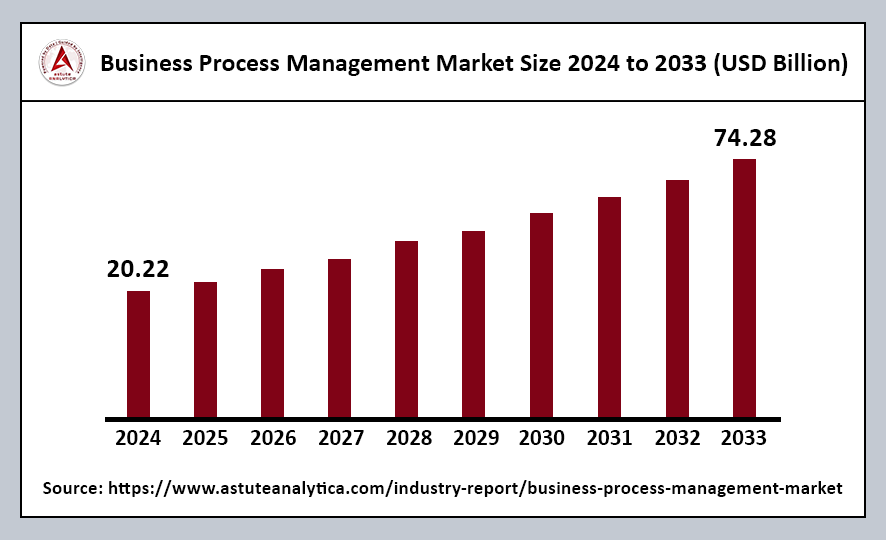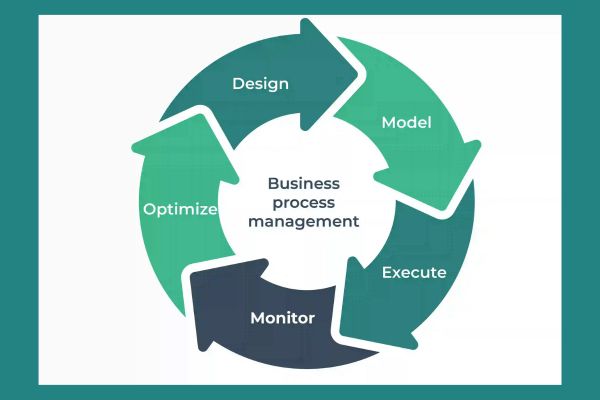The global business process management market was valued at US$ 20.22 billion in 2024 and is projected to reach US$ 74.28 billion by 2033, reflecting a Compound Annual Growth Rate (CAGR) of 14.16% during the forecast period from 2025 to 2033.

The business process management (BPM) market continues to gain traction as organizations increasingly seek streamlined workflows, risk mitigation, and rapid innovation cycles. This growing demand for BPM solutions is evident worldwide, fueled by the need for automation, data-driven decision-making strategies, and advancements in cloud capabilities.
Within this landscape, facility management is thriving, driven by priorities such as sustainability, integrated analytics, and preferences for advanced building technologies. These factors contribute to the resilience of facilities as they adapt to evolving market conditions and consumer expectations. Companies of all sizes—ranging from agile startups to multinational conglomerates—are recognizing the advantages of systematically analyzing and refining their processes. By implementing BPM strategies, organizations can enhance operational efficiency and improve overall performance.
Business Process Management Market Key Takeaways
- By Solutions, Automation services have gained prominence in the business process management (BPM) market, exhibiting a remarkable compound annual growth rate (CAGR) of 21.6%.
- In terms of the end-use industry, the IT and Telecom sectors stand out as the largest consumers of BPM solutions, with a growth rate of 21.8% CAGR.
- When considering enterprise size, large enterprises dominate the BPM market due to their complex operational structures and the urgent requirement for cohesive workflows.
- In the realm of deployment mode, cloud-based solutions have emerged as the dominant force in the BPM market, capturing over 64% of the market share.
Regional Analysis
North America’s Dominance in the BPM Market
North America commands the largest share of the global business process management (BPM) market, holding over 41% of total adoption.
- Culture of Digital Maturity and Innovation: The strong culture of digital maturity in North America fosters an environment where businesses are eager to explore and implement innovative solutions. Companies are increasingly recognizing the importance of BPM as a strategic tool for enhancing operational efficiency and achieving competitive advantages.
- Prevalence of Cross-Industry Partnerships: Another factor contributing to North America’s BPM market leadership is the prevalence of cross-industry partnerships. For instance, telecom and financial services companies often form consortia to share BPM best practices and collaborate on process improvements.
- Demand for Enhanced Collaboration and Communication: The growing demand for enhanced collaboration and communication within organizations is also augmenting the adoption of process modeling solutions. By providing a visual representation of processes, process modeling solutions facilitate better communication and understanding among team members, which is essential for successful project execution.
Anticipated Growth of the BPM Market in Europe
The business process management (BPM) market in Europe is expected to register considerable growth between 2025 and 2033. This anticipated expansion is driven by a range of factors.
- Sustainability Initiatives as a Driving Force: Sustainability initiatives are emerging as a significant driver in the European BPM market. As awareness of environmental issues grows, companies are under pressure to implement strategies that comply with regulations and demonstrate corporate responsibility.
- Contributing to Growth and Competitiveness: By integrating sustainability into their BPM strategies, organizations can enhance their competitiveness in the marketplace. Companies that prioritize sustainable practices often attract a growing base of environmentally conscious consumers and investors.
Growth of the BPM Market in Asia Pacific
The business process management (BPM) market in the Asia Pacific region is experiencing significant growth, boasting the highest compound annual growth rate (CAGR) among global markets.
- Integration of Emerging Technologies: Emerging technologies such as artificial intelligence (AI), machine learning (ML), robotic process automation (RPA), and big data analytics are becoming increasingly essential to business strategies in the region. By facilitating the automation of routine tasks and optimizing workflows, BPM platforms enable businesses to streamline operations and reduce costs.
- Enhancing Decision-Making: In addition to operational efficiency, BPM solutions significantly enhance decision-making capabilities within organizations. This capability is crucial for navigating the complexities of the modern business environment, where timely and accurate decision-making can be the difference between success and failure.
- Staying Competitive in a Digital Landscape: As organizations in Asia Pacific adopt BPM solutions, they position themselves to stay competitive in a fast-evolving digital landscape. The ability to automate processes and optimize workflows increases operational agility and allows businesses to focus on innovation and customer satisfaction.
Top Trends Escalating the Business Process Management Market
Emergence of Microservices-Based BPM Approaches: The emergence of microservices-based BPM approaches is reshaping the landscape of business process management. These architectures emphasize agility and composability, enabling organizations to develop and deploy BPM solutions that quickly adapt to changing business needs.
Integration of Continuous Monitoring Solutions: Another significant trend is the integration of continuous monitoring solutions within enterprise ecosystems. This integration enhances collaboration across departments by providing real-time insights into process performance. Continuous monitoring allows organizations to identify bottlenecks, ensure compliance, and optimize workflows proactively.
Rapid Adoption of Robotic Process Automation: The rapid adoption of robotic process automation (RPA), combined with design innovations, is transforming traditional BPM practices. With design innovations, RPA solutions are becoming more user-friendly and accessible, enabling businesses to implement automation at scale.
Growing Synergy Between AI-Based Analytics and Process Reengineering: There is a growing synergy between AI-based analytics and process reengineering aimed at achieving scalability. Organizations are increasingly leveraging AI to analyze vast amounts of data generated by their operations, providing valuable insights that inform process improvements. This combination fosters a more scalable approach to business operations, allowing organizations to adapt to market changes and customer demands with greater agility.
Proliferation of Modern Platform-Based BPM Solutions: The proliferation of modern platform-based BPM solutions tailored to sector-specific demands is another noteworthy trend. This tailored approach enhances the overall effectiveness of BPM initiatives, ensuring that organizations can meet their strategic goals.
Accelerating Convergence of BPM Practices with Advanced Cloud-Native Orchestration Frameworks: There is an accelerating convergence of BPM practices with advanced cloud-native orchestration frameworks. As organizations increasingly migrate to cloud environments, BPM solutions are being designed to leverage the scalability and flexibility of cloud technology. This convergence not only enhances operational efficiency but also supports the rapid deployment of BPM solutions in a dynamic business landscape.
Business Process Management Market Segmentation
By Solutions
Automation services have risen to prominence in the business process management (BPM) market, growing at a CAGR of 21.6%. This growth is largely due to their ability to transform repetitive tasks into streamlined, software-orchestrated workflows, minimizing human intervention wherever possible.
A key driver of this trend is the automation of document-centric processes, such as invoice management and compliance reporting. By automating these tasks, organizations can significantly reduce the incidence of manual handling errors, leading to improved accuracy and efficiency in their operations. This shift not only enhances productivity but also allows businesses to allocate resources more effectively, focusing on higher-value activities.
By End Use Industry
The IT and Telecom sectors are the largest consumers of the business process management (BPM) market, experiencing significant growth at a CAGR of 21.8%. This rapid expansion is largely attributed to their massive operational footprints and the immense volume of data these industries manage on a daily basis.
In the telecom industry, operators frequently handle thousands of customer activation or deactivation requests every hour. Automation plays a crucial role in this context, dramatically reducing the need for manual validation while ensuring accuracy at scale. By streamlining these processes, BPM solutions enable telecom companies to enhance their efficiency and responsiveness to customer needs.
By Enterprise Size
Large enterprises are at the forefront of the business process management (BPM) market, driven by their extensive operational complexities and the pressing need for tightly integrated workflows. The inherent complexity of their operations necessitates the adoption of BPM solutions to ensure that processes run smoothly and efficiently.
Moreover, these organizations often require an omnichannel alignment for their internal communications. They automate up to 950 interdepartmental handoffs daily, managing tasks that range from HR onboarding to supply chain changes. This level of automation not only streamlines operations but also enhances collaboration across various departments, ensuring that large enterprises can effectively navigate their complex environments.
By Deployment Mode
Cloud-based deployment dominates the business process management (BPM) market, capturing more than 64% market share. This dominance is primarily due to the unparalleled scalability, accessibility, and speed of updates that cloud solutions offer. Organizations can rapidly implement BPM solutions across multiple geographies in under 48 hours, representing a dramatic improvement compared to the weeks-long implementations typically associated with on-premises solutions. This efficiency allows businesses to adapt to changing needs and enhances operational agility.
Recent Developments in the Business Process Management Market
- Cognizant and ServiceNow Partnership: In March 2025, Cognizant announced the launch of an AI-powered dispute management solution in partnership with ServiceNow. This Business Process as a Service (BPaaS) offering is specifically designed for mid-market banks in North America, aiming to streamline the dispute resolution process and enhance customer satisfaction.
- Flokzu’s Expansion into South Africa: In March 2025, Flokzu, recognized as a global leader in business process management and automation (BPM), officially launched its presence in South Africa this year.
- Oracle’s AI Agent Studio: In March 2025, Oracle introduced its AI Agent Studio for Fusion Applications, a platform designed for orchestrating artificial intelligence (AI) agents and teams of agents. Oracle promotes its Agentic AI Studio, unveiled at the OracleCloud World Tour in London, as a significant business process automation accelerant.
- SmartSuite’s Global Expansion: In February 2025, SmartSuite, the next-generation work management platform, announced a major global expansion fueled by $38 million in funding. This latest investment includes a new $13 million Series A round led by Canapi Ventures, with participation from Sorenson Capital and High Alpha.
Global Business Process Management Market Key Players:
- Accenture
- Appian Corporation
- BP Logix, Inc.
- IBM
- Infosys Limited
- Kissflow Inc.
- Nintex Global Ltd
- Open Text Corporation
- Oracle Corporation
- OTRS AG
- Pegasystems Inc.
- PolariseME
- Red Hat, Inc.
- SAP SE
- Software AG
- Tata Consultancy Services Limited
- Tibco Software
- Other Prominent Players
Market Segmentation:
By Solution
- Automation
- Process Modelling
- Content & Document Management
- Monitoring & Optimization
- Content & Document Management
- Integration
- Others
By Deployment
- On-premise
- Cloud
By Application
- IT
- BFSI
- Manufacturing
- Retail
- Government & Defense
- Healthcare
- Others
By End-User
- Large Enterprise
- SMEs
By Geography
- North America
- Europe
- Asia-Pacific
- Latin America
- Middle East and Africa
Source: https://www.astuteanalytica.com/industry-report/business-process-management-market


















